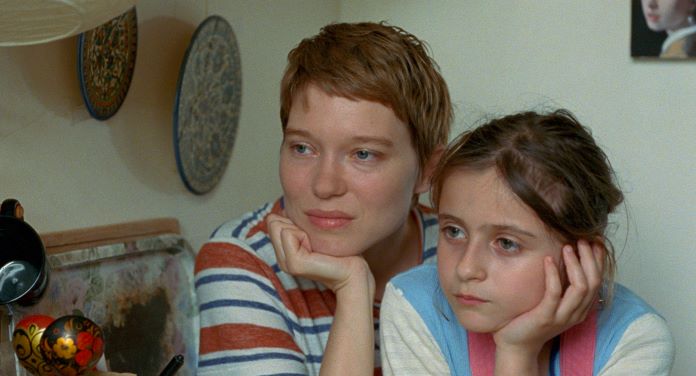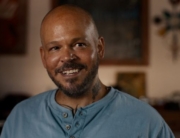
Léa Seydoux, left, and Camille Leban Martins in One Fine Morning (Carole Bethuel/Les Films Pelléas/Sony Pictures Classics)
French director Mia Hansen-Løve (Bergman Island) regards the quotidian and romantic life of a young single mother as sufficiently dramatic material for a feature film, and she doesn’t lean on a narrative based on high impact stakes. That’s what makes the understated One Fine Morning deceptively breezy while it accumulates nuanced moments that add up to a subtly powerful, satisfying work.
Sandra juggles the caretaking of her aging father and her eight-year-old daughter while exploring a new romance. It’s a snapshot of real life—navigating the family connections of the “sandwich generation,” taking care of an elder and a little one, while attempting to have a personal life. Set in Paris, the straightforward story line is heightened by a very attractive and talented cast, most notably the multidimensional Léa Seydoux (Blue Is the Warmest Color, No Time to Die) as Sandra. Sporting cropped hair and minimal makeup—and often wearing a uniform of sweatshirt, jeans, and knapsack—her youthful, gamine style lets her natural beauty shine through as an “ordinary woman.” Seydoux evokes a gentle demeanor that expresses empathy at every turn.
Pascal Greggory (Non-Fiction) as Georg, Sandra’s father, adds an elegant dimension to his former philosophy professor, now an ailing senior losing his sight and memory from a neurodegenerative disease. He forgets details of his daughter’s life, like the fact that she has just one child, the rambunctious Linn (Camille Leban Martins).
Working as a translator for official events, such as a convocation of veterans or a tour of a Calvados factory, Sandra makes her living in the world of words, just as her father once did. Walls of books surround his apartment, but he can no longer read. They were his identity and “form his portrait,” as Sandra says, concerned about their future home when it comes time to scale down and move him to a care facility. He’s a shell of his former self, and Sandra says, “I feel closer to my father with his books than with him,” but that doesn’t keep her from fully participating in his well-being. Later, she finds a notebook where he’s has been tracking his decline and sense of the abyss in the one-way course downhill.
Husky-voiced Nicole Garcia (Netflix’s Lupin) as Sandra’s mother, Françoise, dutifully cares for her ex-husband even though she’s remarried and Georg has a girlfriend. She researches affordable senior residences and helps clean out his apartment. In her free time, she participates in civil disobedience with the Extinction Rebellion movement and is bold enough to commit a minor crime and boast about her stint in jail.
A run-in with an old friend, Clément (By the Grace of God’s Melvil Poupaud), turns into something unexpected for Sandra, but the resulting courtship is complicated. Married with a child, Clément often travels for his work as a cosmochemist (a profession reminiscent of the geochemist in the volcano documentary Fire of Love). A truly erotic relationship ensues, with sexy texts, passionate kissing, and naked bodies reminding us that this is a French film. Sandra’s sensuality is newly awakened after five years as a widow, and she becomes lovesick. Clément, though, vacillates.
However, he bonds with Linn and presents her with a small cardboard house with a solar roof as a representation of his work. She’s accepting of the new man-about-the-house, but she starts to fake a limp, perhaps to get her mother’s attention away from the new beau. During lazy afternoons, the three venture out to some of Paris’s more atmospheric environments, including a trip to see Monet’s Water Lilies at the Musée de l’Orangerie. (Seydoux currently appears in an ad campaign for Louis Vuitton in the same location.) The secluded corner of a romantic café is the site of an intimate conversation for the pair, whose chemistry is palpable.
This wistful tale is a prescription for coming into one’s own while caring for others in day-to-day life. As the eighth film from Hansen-Løve, it is among her finest, on par with the observational Things to Come that follows an older woman played by Isabelle Huppert. No longer needlessly mentioned in conjunction with her former mentor and partner, Olivier Assayas (Clouds of Sils Maria), Hansen-Løve has established herself as an auteur continuing on an upward trajectory.






Leave A Comment